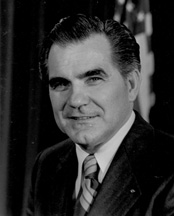William Lloyd Scott
| William Lloyd Scott | |
|---|---|
 |
|
|
United States Senator from Virginia |
|
|
In office January 3, 1973 – January 1, 1979 |
|
| Preceded by | William B. Spong, Jr. |
| Succeeded by | John Warner |
| Member of the U.S. House of Representatives from Virginia's 8th district |
|
|
In office January 3, 1967 – January 3, 1973 |
|
| Preceded by | Howard W. Smith |
| Succeeded by | Stanford E. Parris |
| Personal details | |
| Born |
July 1, 1915 Williamsburg, Virginia |
| Died | February 14, 1997 (aged 81) Fairfax Station, Virginia |
| Nationality | American |
| Political party | Republican |
| Spouse(s) | Ruth Inez Huffman (1915-1998) (m. 1940) |
| Children | 3 |
| Alma mater | National University School of Law (now George Washington University Law School) |
| Profession | Attorney |
| Religion | Methodist |
William Lloyd Scott (July 1, 1915 – February 14, 1997) was a Republican politician from Virginia. He served in both the United States House of Representatives and United States Senate, and was Virginia's first post-Reconstruction Republican Senator.
William L. Scott was born in Williamsburg, Virginia on July 1, 1915. He graduated from high school in St. Albans, West Virginia and began a career with the Government Printing Office. He received an LL.B. from National University School of Law (now George Washington University Law School) in 1938 and an LL.M. in 1939. Scott was admitted to the bar, and was employed as a trial attorney with the Department of Justice until 1966.
Scott served in the United States Army during World War II, enlisting as a Private in April 1945, and receiving his discharge later the same year as a result of the end of the war. He was later active in the American Legion.
He engaged in the private practice of law in Fairfax, Virginia from 1961 to 1966. In 1963 and 1965 he ran unsuccessfully for a seat in the Virginia State Senate. In 1965 he initially appeared to have won, but a recount showed that he had lost by 21 votes.
Scott won the Republican nomination for Virginia's 8th congressional district in 1966. He expected to face 18-term incumbent and House Rules Committee chairman Howard W. Smith, a conservative Democrat, but Smith lost renomination to a more liberal Democrat, State Delegate George Rawlings. With support from conservative Democrats as well as Republicans, Scott handily defeated Rawlings in November. He was easily re-elected twice, and served from January 3, 1967 to January 3, 1973.
...
Wikipedia
